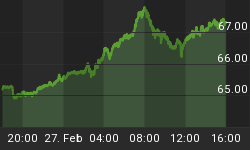Blockbuster video declared bankruptcy on Thursday, and today the CEO vowed that he would evaluate "every single store" in the chain. I think we just found out what is wrong with Blockbuster. What was he doing before, if it wasn't evaluating the stores in the chain?
Of somewhat broader importance were the Durable Goods numbers. Durable Goods ex-transportation were +2.0%, stronger-than-expected and atop a 1% upward revision to the prior month. Capital Goods Orders ex-Aircraft, which helped trigger the double-dip panic last month, was revised from -8% to -5.3%; August came in at +4.1% versus a +3.0% expectation. Equity investors loved the news, but figures like this will certainly decrease, perhaps greatly, the chances of QE2. The Fed isn't likely to print money just to save housing. We all know housing was in a bubble that is being unwound (New Home Sales at 288k today tied the second-lowest figure on record, although in contrast to Existing Home Sales inventories are very low). If the rest of the economy is sound or at least not worsening, then the FOMC's decision will get quite easy.
Now, Durables is one of the most volatile numbers that comes out each month. Many years ago, I showed that a forecast of -0.5 times the prior month's headline figure, with no further analysis, tended to be slightly more accurate than economists' collective guesses. I don't know if that is still true, but the point is that it is very hard to get excited merely from Durables. Overall, of course, the data have failed to collapse in the way they were threatening to do last month, although it is fair to say that they aren't shooting the lights out either!
But equity investors are in a great place right now. If growth may be strong enough so that QE2 is unnecessary, then stocks rally. If growth is weak, that may provoke QE2, so stocks rally (to be sure, it is probably a different clientele in each of those cases). Of course, month-end is approaching and the "cruelest month" is going to show a hefty gain for stocks, so many closet indexers are going to be forced to buy in if they haven't already. It is hard to fade this rally, and it probably does not make sense to do so. But again the VIX did not go to or even threaten new lows, volume was under 1bln shares, and bonds sold off but only a little (10y yield at 2.61%). This is not a robust rally with great internals!
In the afternoon, Philadelphia Fed President Plosser spoke in Zurich on the topic of "Monetary Policy after the Financial Crisis." Some of his remarks are worth noting. He expressed concern that unless the Fed's balance sheet is artificially constrained by rule,
"the temptation may be too great to renege on the pre-announced policy and pursue policies that deliver temporary economic benefits that may be inconsistent with longer-run goals...In the context of monetary policy, this time inconsistency typically results in higher-than-desired inflation."
Of course, placing constraints on the Fed would create the risk that we could have a Lehman-like calamity that the Fed was not allowed to respond to. This would seem to be a bad idea, especially now when the chances of another crisis, while having receded, remain uncomfortably high. Clearly, Plosser fears that the very outcome he is discussing - a further expansion of the Fed's balance sheet that is unnecessary in his mind - might be a threat that is nearer than we think, and he is suggesting something that perhaps coincidentally will allow him to later say "...but I didn't want to expand the balance sheet!" Yet, the plea sounds to me a little like the child suggesting that it would be a good idea to have a curfew on the whole family (including, incidentally, his elder brother who just got a drivers license). It isn't as selfless as it sounds.
In inflation-related news, Barclays Capital this evening announced that TIPS will not be added to the Barclays Aggregate Bond Index, although they will create a new family of combined "Aggregate/Inflation" indices for investors who were unable to do the math themselves from the existing indices. While this news is likely to weaken TIPS, which had been rallying like mad partly because shorts were being flushed ahead of the announcement, it is definitely the right decision (as I argued a couple of days ago here). Folks like me who market inflation expertise as a consultant or asset manager will be in slightly less demand, but Barclays made the right call and for the right reason: a decision to add TIPS to the Agg would take away choices rather than add them. As their statement said:
"Maintaining current rules will enable investors that view inflation-linked debt as a distinct fixed income asset class to continue using their current benchmarks. Those investors that prefer a broader benchmark that does include inflation-linked government debt will soon have a new Barclays Capital benchmark option available to them reflecting this expanded investment choice set."
Good call!
There is no economic data due on Monday aside from regional Fed indices from the Dallas and Chicago districts. With quarter-end a few days away, it makes sense to expect trends in place to continue especially since the Employment number is on October 8th, not October 1st. So rewind the tape of the last couple of weeks, and play it again!















